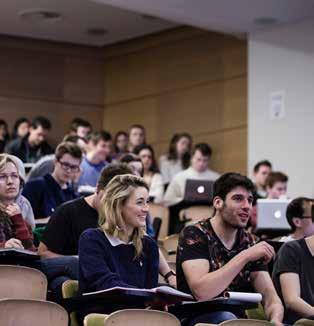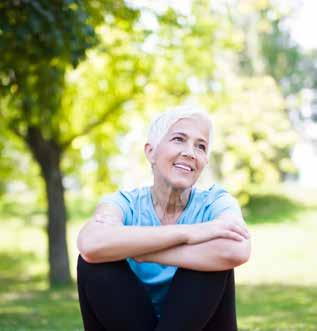
4 minute read
Discipline: Public Health & Health Policy
Development and testing of the acceptability and feasibility of a multicomponent intervention to reduce sedentary behaviour in a workplace setting
PhD Student: Gail Nicolson Supervisor: Associate Professor Catherine Darker and Professor Catherine Hayes Funding: Dean of the Faculty of Health Sciences, Trinity College Dublin
Overview of Project: Over the course of our day, we spend more than seven hours being sedentary, and for most adults, sedentary behaviour mainly occurs in the office workplace. This behaviour puts our health at risk, and the evidence shows that sedentary behaviour is associated with the development of cardiovascular disease and cancers and may lead to a higher risk of death. In particular, workplace sitting appears to be associated with a higher risk of developing pancreatic, lung and breast cancers. Workplace interventions may be important strategies in our efforts to reduce sedentary behaviour and increase physical activity in those who are most at risk. Multiple short bouts of physical activity (rather than long exercise sessions) are likely to be practical and acceptable in the workplace, and evidence suggests that these short sharp bouts of exercise may actually benefit us more. The aim of Gail’s study was to assess the acceptability and feasibility of a gender-sensitive intervention, guided by the socioecological model, to reduce sedentary behaviour among professional men in two workplaces. The main influences of sedentary behaviour were targeted: at the individual level (behaviour change techniques such as goal-setting, self-monitoring), social (collegial support and competition), environmental (change to the workstation), and organisational (management support). Men were each provided with a Garmin watch and the associated web-based/smartphone application, Garmin Connect. An under-desk pedal machine was also provided for the duration of the intervention. Managers were recruited to provide support to the employees.
Long-term impact of project: The Cycle at Work intervention has the potential to change workers’ behaviour by increasing light physical activity. The findings of this research may have significant impact on national policy.
Quote: “Given that the typical workplace is highly sedentary in nature, and that employees and organisations have the authority to implement their own policies, the ‘Cycle at Work’ intervention has the potential to effect real change. This multicomponent intervention could be offered to both employers and employees as part of a wider culture of wellness.”
Delivering equitable healthcare access for adults experiencing homelessness
PhD Student: Rikke Siersbaek Supervisor: Professor Steve Thomas; Dr Sara Burke; Dr Clíona Ní Cheallaigh Funding: Structured Population and HealthServices Education Programme (SPHERE), funded by the Health Research Board
Overview of Project: Rikke’s research aims to understanding how health services are funded, organised, accessed, and delivered from a population health perspective. Within that broader area, she is interested in health inequalities and how health systems facilitate or impede healthcare delivery for vulnerable populations. In particular, Rikke’s PhD research asks how, why, for whom and to what extent health systems factors, such as funding, planning, performance management, service design and culture, impact on healthcare access for populations with complex needs experiencing homelessness.
Long-term impact of project: The overall goal is to influence policy makers who plan and design health services by demonstrating the upstream factors that impact healthcare accessibility for vulnerable populations. Health services can be funded, organised and delivered in ways that make access easier, and healthcare practitioners can be trained to work in ways that promote accessibility and create the right culture in which services can be equitably accessed. PhD Candidate Quote : “I enjoy research and think it is a wonderful, engaging, and challenging career choice. But it is a means to an end – providing evidence to policy makers, practitioners, and managers is crucial.”

GxE interactions in skin cancer and vitamin D status
PhD Student: Rasha Shraim Supervisor: Professor Lina Zgaga and Professor Ross McManus Funding: Science Foundation Ireland Centre for Research Training in Genomics Data Science; Marie Skłodowska-Curie Actions COFUND
Overview of Project: Broadly, Rasha is interested in understanding the interplay of genetics and environment in determining health outcomes. Her research focuses on the effect of sun exposure and genetics on two opposing outcomes: vitamin D status, which benefits from sun exposure and skin cancer risk, which may be worsened by sun exposure. Rasha applies computational and statistical methods to genetic, health, and environmental data from a large UK cohort of approximately half a million people. The goal is to identify genetic or environmental patterns that affect vitamin D status or skin cancer risk and that can eventually be used to inform public health advice around sun protection, supplements, or cancer screenings. Long-term impact of Project: Evidence-based public health advice on sun exposure for vitamin D status and for skin cancer tailored to the affected population and its environment.
Quote: “I hope that this project will contribute to our understanding of the role of vitamin D in human health and, more broadly, promote a more integrative approach to studying genetics and environmental exposures in health research.”











